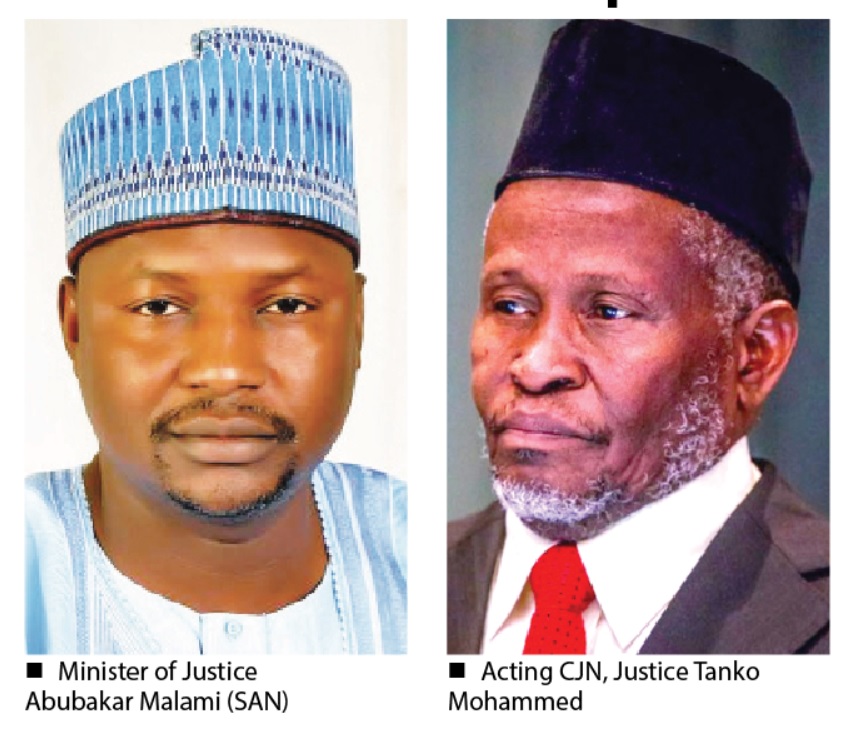How LGs should exercise constitutional powers – Lawyers
Following the recent judgment of an FCT High Court upholding the powers of Local Government Areas to exercise their constitutional functions, lawyers have called on the councils to take steps to assert their powers under the law. The First Schedule of the 1999 Constitution Part I provides for the creation of 774 Local Government Areas […]

Minister of Justice Abubakar Malami (SAN) and Acting CJN, Justice Tanko Mohammed
Following the recent judgment of an FCT High Court upholding the powers of Local Government Areas to exercise their constitutional functions, lawyers have called on the councils to take steps to assert their powers under the law.
The First Schedule of the 1999 Constitution Part I provides for the creation of 774 Local Government Areas in the country, while section 120 and 162 of the Constitution provides for joint account with state governments, which can only be disbursed through approval of the state Houses of Assembly.
Verdict of the Court
In a judgment on the powers of the Area Councils in the FCT on May 5, Justice Charles Agbaza held that the fact that the National Assembly was yet to enact a law to spell out the functions of the area councils as provided under Section 7(5) of the Constitution, does not divest them of their functions.
The pronouncement followed a suit by Abuja-based Senior Advocate of Nigeria, Ogwu James Onoja challenging the move by the Federal Capital Development Authority (FCDA) and Abuja Metropolitan Management Council (AMMC) to replace the road named after him by the Abuja Municipal Area Council (AMAC) with ‘Amma Pepple Crescent’.
“The Constitution had already recognised and indeed accorded those functions as functions of the Local Government Areas or Area Councils, the law to be enacted is mainly to comply with the provisions of the Constitution as the constitution had already under the Fourth Schedule assigned or accorded the Local Government Councils or Area Councils the function which include the naming of streets and roads. See Section 1(g) of the Fourth Schedule of the Constitution,” the judge said.
The judge continued: “The said Section 7(5) of the Constitution makes it clear and unambiguous that the functions to be conferred on the Local Government Councils or Area Councils by law to be enacted by the states Houses of Assembly in case of states and National Assembly in the case of FCT shall include those functions as spelt out under the Fourth Schedule to the 1999 Constitution as main functions of the local government area councils.”
The court dismissed the submission by both FCDA and AMMC that the Area Councils have no power vested on them to name streets and roads without law from the National Assembly.
While restraining the FCDA and all its agencies from further tampering with the street named after Onoja, the judge also awarded the sum of N2m as general damages against AMMC.
Onoja had asked the court to determine whether the FCDA and AMMC or any other department of the Federal Capital has the powers to demolish, dismantle or destroy street posts and signs mounted by AMAC in view of the provisions of sections 7, 303, 328, First Schedule, Part II and Paragraph (g) of the Foùrth Schedule to the 1999 Constitution.
According to Onoja, he received a nomination letter on July 27, 2017 requesting him to subscribe for street naming. And after his checks he paid N25, 000 nomination fee. After the approval of the ‘Ogwu James Onoja Crescent’ on March 5, 2018, he was asked to pay N7,000 per metre length and N3,106 per metre as social contribution to the Area Council.
He further stated that he paid N1m on March 6, 2018 and another N1m on March 7, 2018, adding that since his law firm is also on the street, he changed his correspondences to professional colleagues and clients with the address and also registered the location on Google with special code number 72649 on July 2, 2018 only to on July 16, 2018 see a parallel notice of ‘Amma Pepple Crescent’ placed side by side with his sign post.
What lawyers are saying
Reacting, Barr Obioma Ezenwobodo called for the amendment of the constitution and joint action by stakeholders to ensure the autonomy of local governments in Nigeria.
“Local government administration in Nigeria, which has now been subsumed under the control and directive of the states by their Houses of Assembly as stipulated by sections 7 and 8 of the 1999 Constitution (as amended) and Section 162(6 and 8) of the same Constitution, has emasculated the functions and performance of local governments as third tiers of government,” he said.
Also speaking, Chukwudi Igwe Esq. said the local governments should always go to court to challenge the abuse of their functions and carry the public along. He said he has filed a similar action against the Anambra State Government, but wondered if the Association of Local Governments of Nigeria (ALGON) is actually doing enough to challenge the actions of state and federal governments.
In the same vein, Hameed Ajibola Jimoh Esq. said the autonomy for local governments “gives room for a true constitutional concept of separation of power in Nigeria.”
Fo his part, Ali Zubairu Esq. stated that the best approach was to review the law that permits Joint Account and the provision that allows state Houses of Assembly to make enactments on behalf of the LGs.
A public administration expert, Ozohu-Suleiman Abdulhamid submitted that room for local government autonomy should be created distinct from the provisions of Chapter V, Part I and II for federal and state governments respectively.
“These provisions would automatically override the current ambiguous provision in Section 7, which gives state governments the leeway to manipulate local governments, usurp their statutory functions and plunder their resources,” he said.
